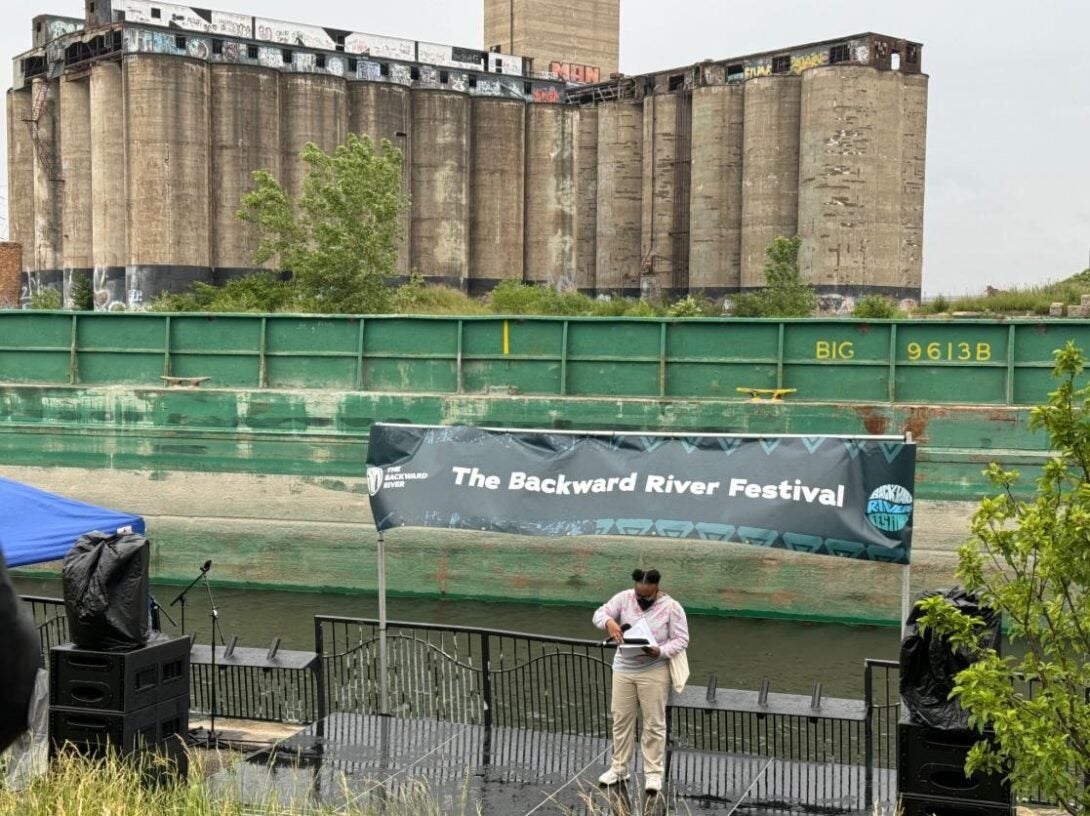Celebrating Chicago’s Riverfront: the transformative power of UIC Freshwater Lab’s Backward River Festival
x

When talking about urban growth and environmental justice, the Chicago River—a vital resource that has influenced the history and infrastructure of the city—is frequently left out. The Freshwater Lab at UIC seeks to rewrite this narrative with the Backward River Festival: Damen Silo City. Held on June 8 along the South Branch of the Chicago River at Canalport Riverwalk Park, the festival embodied the goal of The Backward River digital storytelling project, which seeks to inspire, educate and mobilize Chicagoans to imagine a more equitable and healthy river system for the city.
Rachel Havrelock, professor of english at UIC and director of The Freshwater Lab, outlined the origins of the festival: “The Backward River Festival brings to life the digital storytelling project The Backward River, which was developed by The Freshwater Lab in May 2020 amid record flooding in Chicago and the first wave of the COVID-19 pandemic.”
The project, which was born out of a worldwide crisis and increased consciousness of social inequities, emphasizes how urgent it is to address the effects that today’s water infrastructure has on the environment and public health.
In addition to honoring the river, the festival drew attention to the Damen Grain Silos’ cultural and historical value. Built in 1906 and shut down in 1977 due to an explosion, the silos are now recognized as a landmark and a reminder of Chicago’s industrial roots.
However, questions over the future of this historic monument have been raised by the recent sale of the silos to MAT Asphalt, a business with a contentious environmental record.
“As a monumental landmark of Chicago’s industrial agriculture past, a destination for unofficial urban tourism and a potential public amenity, the silos should be recognized and protected,” Havrelock asserted.
By focusing on the Damen silos, the festival worked to promote a reconsideration of public places and communal resources through asking participants to consider the role that the river plays in their life and to brainstorm other uses for the silos. It offered an opportunity for artists, city planners, writers, scientists and scholars to work together on visualizing and formulating a thriving watershed with equitable access for all.
Attendees of previous Backward River events have been profoundly influenced and expressed excitement about meaningfully interacting with the riverfront. Participants in the 2021 festival revealed that they frequently felt cut off from the riverside parks, which appeared unfriendly and inaccessible. The participatory, family-friendly atmosphere of the festival provided a fresh viewpoint and a feeling of connection, which is an essential engagement for cultivating a sense of responsibility and pride in the community.
Through blending art and performance, local singers and artists–whose creations reflect their love for Chicago and its neighborhoods–fostered an environment of celebration and togetherness. The festival’s message was emphasized by this creative expression: water unites people just like art does.
“Our message is that, like art, water forms a bond among humans. We all need to pay attention to who is allowed to pollute it, who has access to its benefits and who bears the burden of costs and harmful exposures,” Havrelock explained.
The festival’s goal was to further broaden conversations in Chicago regarding community involvement, sustainability and urban development. Through drawing attention to the differences in river access and supporting the adaptive reuse of historic locations like the Damen Silos, the festival advanced an inclusive and equitable urban planning agenda and pushed participants to engage in critical thinking about their surroundings and actively participate in determining the course of their city.
As it continues to gather data and host events like this one, the Backward River project remains committed to encouraging community engagement, creative expression and education to promote environmental justice and a stronger, unified community.